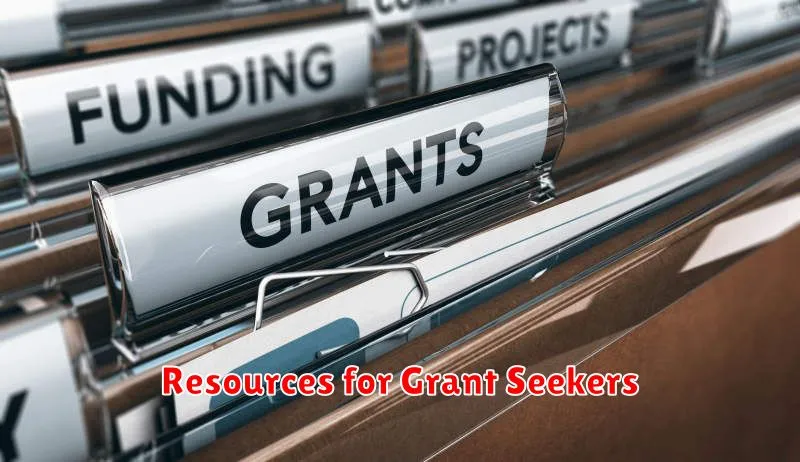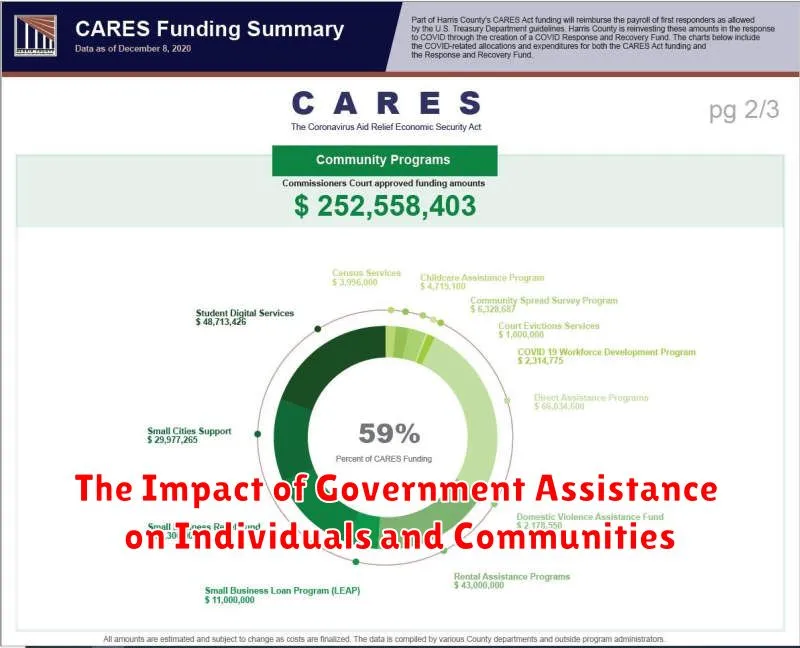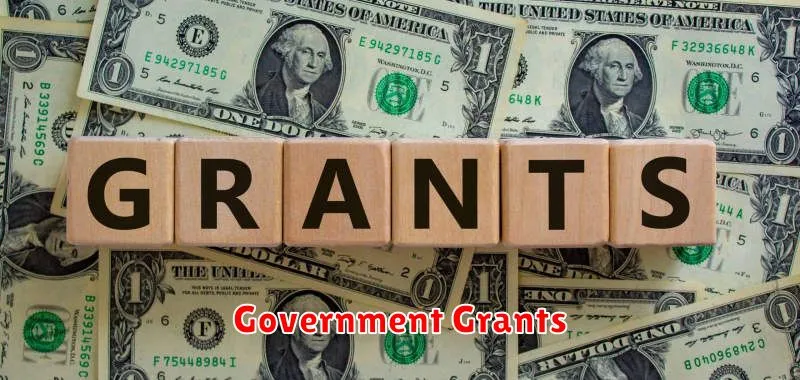Are you struggling to make ends meet? Are you starting a new business and need financial help? Or maybe you’re just looking for ways to save money on your bills? If you answered yes to any of these questions, then you need to know about government grants and assistance programs. These programs can provide you with the financial support you need to achieve your goals, whether it’s paying for education, starting a business, or just making ends meet.
The government offers a wide range of assistance programs, and finding the right one for you can be overwhelming. That’s why we’ve created this guide to help you navigate the world of government grants and assistance programs. We’ll show you how to find the programs you qualify for, how to apply, and what to expect once you’re approved. So, whether you’re a student, a small business owner, a homeowner, or simply looking for ways to save money, read on to learn how to take advantage of these valuable resources.
Understanding Government Grants and Assistance Programs
Government grants and assistance programs are a valuable resource for individuals, businesses, and organizations seeking financial support for a variety of purposes. Understanding these programs can empower you to leverage available funds and achieve your goals. Grants are typically awarded based on merit, need, or specific project goals, while assistance programs often provide direct financial aid or support services.
It is essential to distinguish between grants and assistance programs. Grants are typically non-repayable funds awarded for specific projects or initiatives. Assistance programs, on the other hand, offer financial aid, support services, or other resources to individuals or organizations in need.
There are numerous federal, state, and local government programs available, catering to a wide range of needs and sectors. These programs may focus on education, healthcare, business development, disaster relief, research, and many other areas.
Government grants and assistance programs can significantly benefit individuals, businesses, and organizations by:
- Providing financial resources for projects and initiatives
- Supporting economic development and job creation
- Enhancing access to education and healthcare
- Assisting in disaster recovery efforts
- Promoting research and innovation
To maximize the benefits of these programs, it’s crucial to understand their eligibility criteria, application procedures, and reporting requirements. Researching available programs, networking with relevant organizations, and seeking professional guidance can greatly increase your chances of success.
Types of Government Grants Available
Government grants are a great way to fund your business, education, or personal project. However, it’s important to understand the different types of grants available and how to apply for them. Here are some common types of government grants:
Business Grants: The Small Business Administration (SBA) offers a variety of grants to small businesses. These grants can be used for a variety of purposes, such as starting a business, expanding a business, or improving a business. Some examples include:
- State Trade Expansion Program (STEP) Grants: These grants help businesses expand into new markets and increase exports.
- Small Business Innovation Research (SBIR) Grants: These grants fund research and development for small businesses.
- Small Business Technology Transfer (STTR) Grants: Similar to SBIR grants, these grants support small businesses that collaborate with research institutions.
Education Grants: The federal government offers a variety of grants to help students pay for college. These grants do not need to be repaid. Some examples include:
- Pell Grants: These grants are awarded to undergraduate students with exceptional financial need.
- Federal Supplemental Educational Opportunity Grants (FSEOG): These grants are awarded to undergraduate students with exceptional financial need. They are awarded by participating colleges and universities, not the federal government.
- TEACH Grants: These grants are awarded to students who agree to teach in high-need subjects in low-income schools after graduation.
Housing Grants: The Department of Housing and Urban Development (HUD) offers a variety of grants to help people afford housing. These grants can be used for a variety of purposes, such as home repairs, down payments, and rent assistance. Some examples include:
- Community Development Block Grants (CDBG): These grants are awarded to cities and counties to fund a wide variety of community development projects, including housing.
- HOME Investment Partnerships Program (HOME): These grants are awarded to states and local governments to develop and rehabilitate affordable housing for low- and very-low-income families.
- Housing Choice Voucher Program (Section 8): This program provides rental assistance to low-income families.
Other Government Grants: There are also a variety of other government grants available for a variety of purposes, such as research, environmental protection, and public health. Some examples include:
- National Institutes of Health (NIH) Grants: These grants fund biomedical research.
- National Science Foundation (NSF) Grants: These grants fund scientific research and education.
- Environmental Protection Agency (EPA) Grants: These grants fund environmental protection projects.
To find out more about government grants available to you, contact your local government office or visit the websites of federal agencies that offer grants, such as the SBA, HUD, and NIH.
Eligibility Criteria for Government Assistance
Accessing government grants and assistance programs often requires meeting specific eligibility criteria. These criteria vary depending on the program and the government agency administering it. However, some common eligibility requirements include:
Citizenship or Residency: Most programs require applicants to be U.S. citizens or legal permanent residents.
Income Level: Many programs have income limits, with priority often given to low-income individuals and families.
Age: Certain programs target specific age groups, such as children, seniors, or veterans.
Employment Status: Some programs may be limited to unemployed individuals or those working in specific industries.
Location: Some assistance programs are geographically restricted to specific states or counties.
Other Factors: Depending on the program, other factors like disability status, family size, or educational attainment might also influence eligibility.
It’s crucial to thoroughly research the specific program you’re interested in to understand its eligibility criteria. You can find detailed information on government agency websites, contact the agency directly, or seek assistance from community organizations specializing in government assistance.
Where to Find Government Grant Opportunities
Finding the right government grant opportunities can be a daunting task. However, there are several valuable resources available to help you navigate this process:
Grants.gov is a centralized platform for federal grant opportunities. It offers a comprehensive search engine and allows you to filter grants based on your specific needs and criteria.
USA.gov provides information on federal grants and assistance programs, offering a wide range of resources, including eligibility criteria, application procedures, and contact information.
The Small Business Administration (SBA) is a key resource for small businesses seeking funding. Their website features information on grant programs, loan options, and other forms of assistance.
State and Local Government Websites often have their own grant programs, focusing on specific needs within their jurisdiction. You can find these by searching the websites of your state and local governments.
Nonprofit Organizations dedicated to specific fields or causes may also offer information about relevant government grants. Search for organizations related to your area of interest.
Remember to carefully read the eligibility requirements and application instructions for each grant opportunity you consider. By utilizing these resources, you can effectively locate government grants tailored to your needs and enhance your chances of securing funding for your endeavors.
The Application Process for Government Grants
Applying for government grants can be a daunting process, but it doesn’t have to be. By understanding the process and following these steps, you can increase your chances of success.
1. Research and Find the Right Grant
Start by identifying the specific grant programs that align with your project or needs. Utilize resources like the Grants.gov website, which provides a comprehensive database of federal grant opportunities.
2. Carefully Read the Guidelines
Each grant program has specific eligibility criteria and application requirements. Thoroughly review the grant guidelines, which can often be found on the funding agency’s website. Pay attention to details such as:
- Eligibility requirements for organizations and projects
- Application deadlines and submission procedures
- Required documentation and supporting materials
- Grant amount and duration
3. Craft a Compelling Proposal
Your grant proposal is your opportunity to convince the funding agency that your project is worthwhile and deserving of support. A well-written proposal should clearly articulate:
- The problem your project addresses
- Your proposed solution and methodology
- The expected outcomes and impact
- Your budget and financial plan
4. Seek Feedback and Proofread Carefully
Before submitting your application, it’s essential to get feedback from trusted individuals, such as mentors, colleagues, or grant writing professionals. Proofread your proposal meticulously to ensure accuracy and clarity.
5. Submit Your Application on Time
Adhere to the application deadline provided in the grant guidelines. Late submissions are often not accepted.
Tips for Writing a Successful Grant Proposal
Writing a winning grant proposal is crucial for securing government funds and resources. Here are some key tips to ensure your proposal stands out:
1. Understand the Grantor’s Priorities: Before writing, thoroughly research the specific grant program and its funding priorities. Align your project’s objectives with these priorities to demonstrate relevance and impact.
2. Compelling Narrative: Present a clear, concise, and compelling narrative that effectively conveys your project’s significance and potential impact. Use strong storytelling to engage the reader and create a lasting impression.
3. Strong Budget Justification: Develop a detailed and justified budget that clearly outlines how the funds will be used. Explain each item and demonstrate its necessity for project success.
4. Emphasize Sustainability: Highlight the project’s long-term sustainability and how it will create lasting positive change. Show how the project will continue to benefit the community beyond the grant period.
5. Proofread Thoroughly: Before submitting your proposal, meticulously proofread for grammatical errors, typos, and inconsistencies. A polished proposal reflects professionalism and attention to detail.
6. Seek Feedback: Share your proposal with trusted colleagues or mentors for feedback and suggestions. An outside perspective can help identify areas for improvement.
7. Adhere to Guidelines: Carefully follow all submission guidelines provided by the grant agency, including deadlines, formatting requirements, and allowable attachments.
By following these tips, you can significantly increase your chances of writing a successful grant proposal that secures the funding you need to make a positive impact.
Managing Your Grant Funds Effectively
Once you’ve secured a government grant, the real work begins: managing those funds effectively to achieve your project goals. Here’s a breakdown of key steps to ensure responsible and successful utilization of your grant:
1. Understand the Grant Agreement
Thoroughly read and understand the terms and conditions of the grant agreement. This document outlines the specific requirements, reporting obligations, and permissible uses of the funds. Pay close attention to:
- Eligible expenses: What can you spend the grant money on?
- Matching requirements: Do you need to provide a portion of the funding yourself?
- Reporting deadlines: When are progress reports and financial statements due?
- Auditing procedures: How will your use of funds be audited?
2. Establish a Budget and Tracking System
Develop a detailed budget that aligns with your project plan. Categorize expenses and track spending diligently. This could involve using spreadsheets, accounting software, or a dedicated grant management system. Regularly monitor your budget to ensure you’re staying within the allocated funds.
3. Maintain Accurate Records
Keep meticulous records of all grant-related transactions, including receipts, invoices, and supporting documentation. This not only helps you stay organized but also ensures transparency and accountability during future audits.
4. Seek Guidance and Support
Don’t hesitate to contact the granting agency or a qualified financial advisor if you have questions or encounter challenges. They can offer valuable insights and support in navigating the complexities of grant management.
5. Adhere to Ethical Practices
Uphold the highest standards of ethical conduct. Avoid any misuse of funds or conflicts of interest. Your integrity is crucial for maintaining a strong relationship with the granting agency and ensuring the long-term sustainability of your project.
By diligently managing your grant funds, you can maximize their impact, achieve your project objectives, and build a solid foundation for future grant opportunities.
Common Mistakes to Avoid When Applying for Grants
Applying for grants can be a daunting task, but it’s essential to avoid common mistakes that could hinder your chances of securing funding. Here are some crucial tips to keep in mind:
1. Not Researching Thoroughly: Before applying, thoroughly research available grants. Understand the eligibility criteria, funding priorities, and application deadlines. A well-researched application demonstrates commitment and understanding.
2. Ignoring Deadlines: Late submissions are rarely accepted. Mark deadlines prominently and submit your application well in advance to avoid last-minute rush and potential errors.
3. Lack of Strong Proposal: Your proposal is your chance to impress the grant reviewers. Clearly articulate your project goals, objectives, and how the grant will be used. Provide detailed budgets and compelling narratives.
4. Neglecting Proofreading: A well-written, error-free application is crucial. Proofread your proposal carefully for any grammatical, spelling, or formatting errors.
5. Failing to Follow Instructions: Each grant program has specific guidelines. Adhering to these instructions is essential. Submitting incomplete or non-compliant applications can result in automatic rejection.
6. Overlooking Follow-Up: After submitting your application, don’t forget to follow up with the grant agency. Inquire about the status of your application and express your continued interest in the funding opportunity.
By avoiding these common pitfalls, you can increase your chances of securing the grants you need to achieve your project goals. Remember, a well-prepared and thoughtful application is key to success.
Resources for Grant Seekers

Finding the right government grant or assistance program can be a daunting task. However, there are several resources available to help you navigate the process.
Here are some valuable resources for grant seekers:
Government Websites
The first stop should be the official websites of government agencies that offer grants.
For example, the Grants.gov website is a comprehensive platform that lists grants from various federal agencies.
It’s essential to familiarize yourself with the specific requirements and eligibility criteria for each grant.
Grant-Making Organizations
Several private organizations and foundations also offer grants to support various initiatives.
The Foundation Center is an excellent resource for finding funding opportunities from private foundations and corporations.
Grant Writing Resources
Once you’ve identified potential funding sources, you’ll need to craft a compelling grant proposal.
Many resources are available to help you with the grant writing process. The Small Business Administration (SBA) provides guidance on writing business plans and grant proposals.
Consider consulting a professional grant writer for assistance with complex grant proposals.
Networking and Mentorship
Networking with other grant seekers and experienced grant writers can provide invaluable insights and support.
Attend grant-writing workshops, join online forums, and connect with mentors in your field.
These connections can provide valuable tips, feedback, and guidance throughout the grant-seeking process.
Professional Associations
Many professional associations offer resources and support to members seeking grants.
These associations often have grant writing workshops, networking events, and access to exclusive funding opportunities.
By utilizing these resources, you can significantly improve your chances of successfully securing government grants and assistance programs to fund your projects and initiatives.
Success Stories: Beneficiaries of Government Grants

Government grants and assistance programs have been instrumental in helping individuals and businesses achieve their goals. From small startups to established organizations, these programs provide crucial financial support and resources. Here are a few success stories that highlight the impact of government grants:
Sarah’s Small Business: Sarah, a single mother, always dreamed of starting her own bakery. With the help of a small business grant, she was able to purchase equipment and secure a storefront. Her bakery became a local favorite, providing her with a stable income and allowing her to provide for her family.
Community Center Renovation: A local community center was struggling to maintain its building, which was in dire need of repairs. A grant from the Department of Housing and Urban Development enabled them to renovate the center, creating a safe and welcoming space for community events, educational programs, and social gatherings.
Student Success: John, a first-generation college student, was facing financial hardship. A Pell Grant provided him with the financial support he needed to focus on his studies. He graduated with honors and landed a well-paying job, making him a success story of government assistance for higher education.
These are just a few examples of how government grants have transformed lives and communities. By taking advantage of these programs, individuals and businesses can achieve their dreams and make a positive impact on their surroundings.
The Impact of Government Assistance on Individuals and Communities

Government assistance programs play a crucial role in supporting individuals and communities. These programs can provide a safety net for those facing financial hardship, offering vital resources for basic needs like food, housing, and healthcare. By providing financial aid and access to essential services, government assistance can help individuals overcome temporary challenges and achieve self-sufficiency. Furthermore, it can empower communities by addressing systemic issues such as poverty, unemployment, and lack of access to education.
The impact of government assistance extends beyond individual beneficiaries. It can stimulate economic growth by creating jobs, supporting small businesses, and investing in infrastructure. By reducing poverty and inequality, government assistance contributes to a more stable and just society. It also promotes social cohesion and strengthens communities by fostering cooperation and mutual support.
Government assistance programs can provide opportunities for individuals and communities to break the cycle of poverty and achieve their full potential. By providing resources and support, these programs can empower individuals to overcome obstacles, acquire new skills, and improve their quality of life. They can also help communities to thrive by addressing social and economic challenges and creating a brighter future for all.

